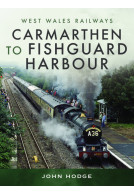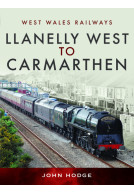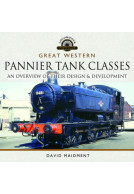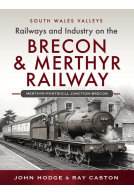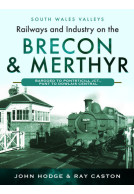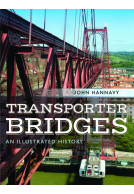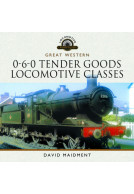Railways and Industry in the Tondu Valleys (Hardback)
Ogmore, Garw and Porthcawl Branches
Imprint: Pen & Sword Transport
Series: South Wales Valleys
Pages: 222
Illustrations: 370
ISBN: 9781526726599
Published: 4th November 2019
(click here for international delivery rates)
Order within the next 9 hours, 20 minutes to get your order processed the next working day!
Need a currency converter? Check XE.com for live rates
| Other formats available - Buy the Hardback and get the eBook for free! | Price |
|---|---|
| Railways and Industry in the Tondu… ePub (129.5 MB) Add to Basket | £15.59 |
The books give a history of the railway, coal mining and other industrial aspects of each Valley that combine to make up the Tondu Valleys with detailed comments on the operation of the railway, passenger and freight, and details of each colliery within the area and their place within the South Wales coalfield. Details are provided on individual aspects of railway operation. Each location is studied in detail with abundant photographs of railway and colliery activity. This is the first time such a study of this area has been undertaken in such detail.
The study of Porthcawl traces its development from a dock to a seaside resort with supporting photographs of both aspects.
This volume will give the reader an ample knowledge of this important part of South Wales as part of a series of books on the South Wales Valleys, to complement the two books on the Western Valley already produced.
Featured by
6024 Preservation Society
This is a companion to the Bridgend to Treherbert volume by the same authors and covers the remaining lines radiating from Tondu, ie to the east to Nantymoel, Blaengarw, Gilfach Goch and Llanharan and to the west to Porthcawl and the beginning of the line to Margam. Each line is described and illustrated with its historical background and, considering the early date of withdrawal of passenger services (1930 at Gilfach Goch) there are a number of early pictures of especial interest, as well as those from the 1950s as photographers sought to capture the rapidly disappearing infrastructure. The authors have done well to find several pictures on the Bryncethin Junction to Llanharan line that never had a passenger service where photographers had to be lucky or have inside knowledge! The re-opening of some of the lines for tip recovery in the 1990s was photographed in colour and is also included. In addition the enthusiast specials over the lines covered by both volumes are listed (with acknowledgement to sixbellsjunction web-site) and there are two illustrated chronologies of services on 7th July 1960 at Porthcawl and on 3rd May 1958, the last day of passenger services to Nantymoel.
Backtrack Magazine
As with the first volume, the quantity of illustrations and the very high standard of the captions again speak of the personal knowledge of the authors. The printers have done an excellent job of maintaining accurate colour values and adequate contrast on monochrome images on the same page. There are sufficient maps to help the reader orient themselves although the complete stranger will probably have to refer to the Ian Allan or Cooke Atlas from time to time! There is an index and most pictures are two per A4 page enabling detail to be appreciated. There are three or four pictures which have been over enlarged or digitally enhanced but the standard is generally good. There are a few pictures of the industrial locomotives in the collieries but there is no comprehensive coverage. This book is also recommended as a valuable addition to the documentation of South Wales railways.
Review by Gerry Nichols
The Stephenson Locomotive Society
This book is commended as valuable addition to the documentation of South Wales railways.
This is the second part of the authors’ comprehensive study of the railways radiating from Tondu. Once again, a magnificent range of images has been collected, featuring regular passenger and freight workings, as well as enthusiast specials and main line diversions, some in colour. Pictures of Caedu, Heol-y-Sheet and Blackmill Junction Signal Boxes must surely be uncommon and this reviewer was much taken with the images of ‘sandwich’ auto-workings in the Ogmore valley and the viaduct at Blackmill. Another exceptionally good work.
West Somerset Railway Association
A very detailed study.
Miniaturas JM
Read the full Spanish review here
Detailed analysis of railway operating practices and layouts and of colliery history and production tonnages.
Bookseller Buyers Guide
About Stuart Davies
Stuart Davies is a native of the Ogmore Valley and spent much of his formative years observing the operations at Tondu depot and its associated railway environs. This inspired him to pursue a railway career based initially in South Wales, then Carlisle, Bristol, East Anglia and the West Midlands, finally becoming a Senior Operations Executive.
About John Hodge
The late John Hodge was a former railwayman, who started his working life on the Western Region in South Wales in 1961, later transferring to London Paddington and British Railways Board. He was brought up in Barry, a port town west of Cardiff, which has strong railway connections, once being an important port for coal traffic and later being famous for Woodham Brothers scrap yard, and which held over 200 locomotives that are now mostly preserved on heritage lines. John was a lifelong railway enthusiast and historian, with many railway histories published.










